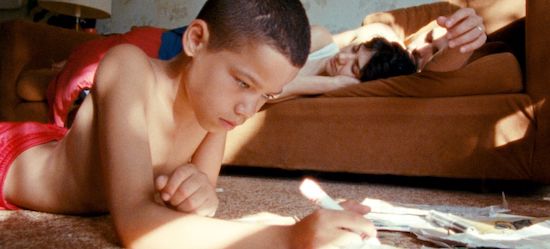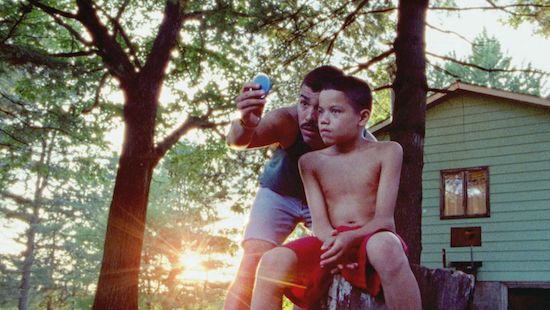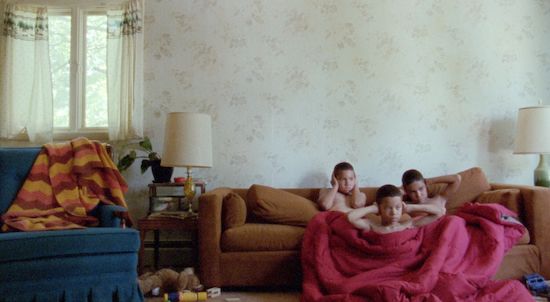We the Animals: A Writer and Director in Sync
Jeremiah Zagar wasn’t the first filmmaker to approach novelist Justin Torres about adapting the latter’s 2011 coming-of-age tale We the Animals to screen. But the others were “too Hollywood,” according to Torres, and wanted to change his semi-autobiographical story into something else. (“Breaking Bad meets Malcolm in the Middle,” suggested one would-be suitor.) Torres was having none of it. Then Zagar contacted him. The director, a documentary maker (In a Dream, Captivated: The Trials of Pamela Smart) who’d never helmed a fiction film before, had picked up the book in McNally Jackson in Soho and couldn’t put it down. “It had one of the best first pages I’d ever read,” he says.
Torres and Zagar were discussing the making of We the Animals during a post-screening Q&A, one of several the pair have conducted while promoting the film. The project is something they’re clearly proud of and passionate about.
The book is a raw, pulsating, first-person account of three brothers and their volatile parents loving and fighting each other in an upstate New York town, as told by the youngest boy. It’s based on Torres’ own life and family, including the fact that his father is Puerto Rican and his mom of Irish-Italian descent. Though it was very different from Zagar’s own hippie-esque upbringing, he understood the “epic family mythology” of Torres’ book, the insular experience of a strong family dynamic. “We spoke the same language,” agree both writer and filmmaker. Torres was subsequently very much part of the filmmaking process, from casting (all three of the boys are first-time actors) to finding the right house for the family in the film.
Per Zagar’s desire for the film to have a “fast-paced, musical quality,” We the Animals is energetic and propulsive. The powerful and poetic film is largely faithful to Torres’ story, capturing the energy and emotion of a tightknit family under duress. (Zak Mulligan’s stylized yet naturalistic cinematography deserves much credit.)
In the beginning of the film, the brothers – Manny, the oldest (Isaiah Kristian), Joel (Josiah Gabriel) and the film’s protagonist Jonah (Evan Rosado) seem like one unruly organism, running through the woods yelling, crouching under a sheet with a flashlight, chanting “body heat, body heat,” and dancing along with their young father Paps (Raúl Castillo) as he cooks and blasts music in the kitchen. But Jonah quickly stands out, waking up at night while his brothers are sleeping to crawl under the bed and draw in his journal by flashlight. His dark, scratchy drawings punctuate the film, evolving into animated sequences (courtesy of illustrator Mark Samsonovich) that express his turbulent inner emotions. Ma (Sheila Vand) acknowledges his sensitivity, coddling and reassuring him, “I’ll never let anything bad happen to you.”
We find out that Ma and Paps met when they were kids themselves and though they left Brooklyn in pursuit of a better life, their relationship and existence are fraught, equal parts physical abuse and deep affection; Paps, who sometimes drinks to excess, is especially apt to lash out. Ma’s exhausting assembly-line job in a bottling plant and his gig as a night watchman don’t quite make ends meet, exacerbating their woes. After a traumatic scene – one of several – in which Paps teaches Jonah how to swim the hard way at a nearby lake, the couple fight in the car on the way home, as the boys watch quietly. There are many closeups of their faces throughout the film: watchful, not really comprehending their parents’ battles, but joyful when the couple inevitably reconciles.
And no wonder. When Paps decides he’s had enough and leaves the family for a spell after one particularly gruesome fight, Ma can’t get herself out of bed and the boys are left to fend for themselves. Hungry, they steal food from a local store, then raid a neighboring farmer’s garden. They wind up hanging out with his grandson, Dustin, a slightly older boy who introduces the three to heavy metal and porn. This awakens scary new feelings in Jonah, who subsequently dreams of Dustin and himself underwater. Already quieter and less violent than his brothers, Jonah becomes even more alienated by his hidden feelings. “We’re never going to escape this,” says Paps at one point about the plight of his family. Eventually, however, Jonah does exactly that, after an explosive catharsis that seems a very long time coming.
We the Animals opens on Friday at at the Angelika Film Center and The Landmark at 57 West.
—Marina Zogbi




